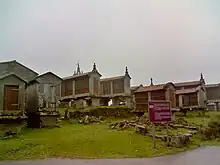eira
Galician

Eira da Ermida: a group of garners built by an old threshing floor
Alternative forms
Etymology
Inherited from Old Galician-Portuguese eira (13th century, Cantigas de Santa Maria), from Latin ārea (“threshing floor, open space”). Cognate with Portuguese eira, Spanish and Catalan era, Occitan ièra, French aire, Italian aia and Romanian arie. Doublet of área, borrowed from the same Latin word.
Pronunciation
- IPA(key): /ˈejɾa̝/
Noun
eira f (plural eiras)
- threshing floor (a yard, usually paved, used as a clean and even surface for threshing cereals)
- yard
- 1853, Xoán Manuel Pintos, A Gaita Gallega, page 158:
- Inda a nai non pon o pé
por adentro do portelo
xa chegan os seus miniños
«a min, a min berberecho» ;
cisca uns poucos pola eira
os rapaces van collé-los
de gatiñas uns con outros
levantandose e caendo.
Dimpois tódo-los da casa
arredor do fol ou cesto
non se afartan de gandire
os birbirichiños frescos;- Mother hasn't even
put her foot ahead the gate
when her children come asking
«to me, to me, cockle»;
she scatters a few by the yard
the kids try to catch them
squatting, ones and others
standing and falling.
Later, everyone at the house,
around the bag or basket,
they don't get tired of devouring
the fresh little cockles;
- Mother hasn't even
Derived terms
References
- “eira” in Dicionario de Dicionarios do galego medieval, SLI - ILGA 2006–2022.
- “eira” in Xavier Varela Barreiro & Xavier Gómez Guinovart: Corpus Xelmírez - Corpus lingüístico da Galicia medieval. SLI / Grupo TALG / ILG, 2006–2018.
- “eira” in Dicionario de Dicionarios da lingua galega, SLI - ILGA 2006–2013.
- “eira” in Tesouro informatizado da lingua galega. Santiago: ILG.
- “eira” in Álvarez, Rosario (coord.): Tesouro do léxico patrimonial galego e portugués, Santiago de Compostela: Instituto da Lingua Galega.
Guaraní
Old Galician-Portuguese
Pronunciation
- IPA(key): /ˈei̯.ɾa/
Noun
eira f
- threshing floor (a yard, usually paved, used as a clean and even surface for threshing cereals)
Further reading
Portuguese
Pronunciation
- (Brazil) IPA(key): /ˈe(j).ɾɐ/ [ˈe(ɪ̯).ɾɐ]
- (Southern Brazil) IPA(key): /ˈe(j).ɾa/ [ˈe(ɪ̯).ɾa]
- (Portugal) IPA(key): /ˈɐj.ɾɐ/
- (Northern Portugal) IPA(key): /ˈej.ɾɐ/
- (Central Portugal) IPA(key): /ˈej.ɾɐ/
- (Southern Portugal) IPA(key): /ˈe.ɾɐ/
- Rhymes: -ejɾɐ
- Hyphenation: ei‧ra
Etymology 1

eira
Inherited from Old Galician-Portuguese eira (“threshing floor”), from Latin ārea (“threshing floor, open space”). Cognate to Galician eira, Spanish and Catalan era, Occitan ièra, French aire, Italian aia and Romanian arie. Doublet of área, borrowed from the same Latin word.
Derived terms
Welsh
Alternative forms
- eiry (obsolete)
Pronunciation
- IPA(key): /ˈei̯ra/
- Rhymes: -ei̯ra
Noun
eira m (plural eiraoedd) (usually uncountable)
Mutation
| Welsh mutation | |||
|---|---|---|---|
| radical | soft | nasal | h-prothesis |
| eira | unchanged | unchanged | heira |
| Note: Some of these forms may be hypothetical. Not every possible mutated form of every word actually occurs. | |||
References
- R. J. Thomas, G. A. Bevan, P. J. Donovan, A. Hawke et al., editors (1950–present), “eira”, in Geiriadur Prifysgol Cymru Online (in Welsh), University of Wales Centre for Advanced Welsh & Celtic Studies
This article is issued from Wiktionary. The text is licensed under Creative Commons - Attribution - Sharealike. Additional terms may apply for the media files.
